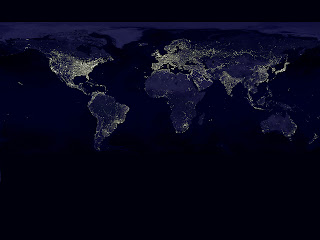ecologismo
23
Abr 10
Estos son sus socios en el Día de la Tierra
23
Jul 09
Luisfi en la radio
Hoy, a la 1:00 p.m. (Central Time), estaré en el programa de radio Todo a pulmón que conducen mis amigos Marta Yolanda Díaz-Durán y Jorge Jacobs. El programa se transmite en 100.9 F.M. y en libertopolis.com
13
Nov 08
El mundo sin pinabetes
24
Dic 07
De Luisfi para Luis
El cuate, Luis Godoy, dejó una pregunta muy interesante en mi entrada anterior, y creo que vale la pena comentarla. Tengo tres razones para que me desagraden los focos ahorradores como regalos navideños: 1. No me gustan los regalos puramente utilitarios, es como regalar una resma de papel toilette, o 6 latas de yuquilla. Mientras más hedonistas son los obsequios, mejor; 2. No me gusta la luz de los focos ahorradores, por eso sólo los tengo en el área de servicio; y 3. No me gusta ese tipo de activismo.
Por cierto que el The New York Times, que publica Prensa Libre, trajo un hermoso reportaje sobre qué tan beneficiosos son los productos verdes. Los que se interesan por estos temas deberían leerlo.
Este chiste ya lo conté hace ratos, pero creo que es atingente para ilustrar la ocasión: Una vez le preguntaron al embajador de los Estados Unidos de América en la ONU que qué quería para la Navidad; y el representante diplomático contestó que quería paz y prosperidad para todos. La misma pregunta se la hicieron al representante de la extinta Unión Soviética y el embajador contestó que quería igualdad y justicia social para todos. Cuando le preguntaron al jefe de la legación británica, el embajador de Su Majestad contestó que quería un pudín de ciruelas.
Ese sujeto y yo, nos entenderíamos.
04
Abr 07
El reino de las tinieblas
 De amigos y parientes -seguramente bien intencionados- he recibido la siguiente invitación: “Se esta haciendo una propuesta desde América Latina, de Venezuela a todos los habitantes de este mundo… para que apaguemos los focos, los bombillos , las luminarias, como se llamen, los televisores , las radios, las computadoras, todo aparato eléctrico o que genere consumo de energía…. el próximo X de abril de 2007 a las 7.53 p.m. por sólo 7 minutos, cada país en su horario. En ese tiempo nos uniremos en una oración por la paz y el amor universal. Esto produciría un efecto psicológico mundial de fraternidad y hermandad”; y hasta aquí la cosa no pasaba de parecer un mero New Age touchie feelie. Pero luego aparece el peine porque la invitación dice que también producirá “un gran ahorro de energía…se propone apagar todas las luces para darle un respiro al planeta. Si la respuesta es masiva, el ahorro energético puede ser brutal”.
De amigos y parientes -seguramente bien intencionados- he recibido la siguiente invitación: “Se esta haciendo una propuesta desde América Latina, de Venezuela a todos los habitantes de este mundo… para que apaguemos los focos, los bombillos , las luminarias, como se llamen, los televisores , las radios, las computadoras, todo aparato eléctrico o que genere consumo de energía…. el próximo X de abril de 2007 a las 7.53 p.m. por sólo 7 minutos, cada país en su horario. En ese tiempo nos uniremos en una oración por la paz y el amor universal. Esto produciría un efecto psicológico mundial de fraternidad y hermandad”; y hasta aquí la cosa no pasaba de parecer un mero New Age touchie feelie. Pero luego aparece el peine porque la invitación dice que también producirá “un gran ahorro de energía…se propone apagar todas las luces para darle un respiro al planeta. Si la respuesta es masiva, el ahorro energético puede ser brutal”.
In our individual lives it is quite rational to want the most for the least. We want the highest quality food, automobiles, and houses for the lowest price. And we want to pay as little as possible to run our cars, heat our homes, and power our consumer electronics. This means we want to waste as little as possible because waste is money that could be spent on other needs. So turning off the lights in an unused room is an act of self-interest.
We must keep focused clearly on the fundamental issues in every discussion about the environment: the right of individuals to pursue their own well-being as they see fit; the requirement that man the creator utilize the material and energy in the environment to meet his needs; the rational exercise of our minds as the way to discover the best means to do so; and the exercise of that capacity as a source of pride and self- esteem
The spectacle of a city skyline shining at night is the beauty of millions of individuals at their most human.
01
Mar 07
Los automóviles mejoraron la calidad del aire
 De Cris Lingle recibí este artículo de Dwight Lee. Está en inglés, pero explica cómo es que los motores de combustión interna, tan denostados por algunos que proponen “hacer algo” para evitar que se ensucie el ambiente, en realidad han contribuido efectivamente a que el ambiente sea más limpio.
De Cris Lingle recibí este artículo de Dwight Lee. Está en inglés, pero explica cómo es que los motores de combustión interna, tan denostados por algunos que proponen “hacer algo” para evitar que se ensucie el ambiente, en realidad han contribuido efectivamente a que el ambiente sea más limpio.
By Dwight R. Lee
The abuse heaped on the internal combustion engine by environmentalists was never justified. But a recent story on cow flatulence in the British newspaper, The Independent, makes the environmental benefits from gasoline-powered engines even more obvious. Based on a recent study by the Food and AgriculturalOrganization, The Independent reports that “livestock are responsible for 18 percent of the greenhouse gases that cause global warming, more than cars, planes and all other forms of transport put together.”
Long before global warming became an environmental concern, however, the move from the power provided by animals to that provided by gasoline had greatly improved the environment. The emissions that came out of the tailpipes of horses were much more lethal pollutants that those now coming out of the tailpipes of cars. Horse emissions did more than make our town and cities stink; they spread fly-borne diseases and polluted water supplies that killed people at a far greater rate than the pollution from cars and trucks ever have.
Photochemical smog is clearly a health risk, but not nearly the health risk of cholera, diphtheria and tetanus that have been largely eliminated with the help of gasoline powered transportation.
Before the internal combustion engine it wasn’t just cows, sheep and pigs emitting pollution down on the farm. Tractors and other types of gas-powered farm machinery eliminated the horses, mules and oxen that had provided most of the power necessary to grow and harvest our food and fiber. This not only reduced the problem that still exists from animal waste that environmentalists, with justification, still complain about. The internal combustion engine also eliminated the need to produce food to fuel millions upon millions of agricultural beasts of burden. It has been estimated that in 1900 it took about 93 million acres of land to grow the food for the farm animals that were replaced by current farm machinery. Most of that land has now gone back to woodlands, greatly increasing the number of trees that are reducing the problem of global warming by absorbing carbon dioxide.
The above consideration should have been enough to warrant an environmental shrine to the internal combustion engine. And now we find that by eliminating all those farm-yard animals, the internal combustion engine also eliminated vast amounts of methane-producing flatulence, which is a much more powerful greenhouse gas than the carbon dioxide produce by burning gasoline.
Even though the internal combustion engine is less polluting than what it replaced, it is obviously not pollution-free. Efforts should, and will be made to make it even less polluting than it is, and some day internal combustion will be replaced by an even less polluting technology. But history will look kindly on the internal combustion engine as a major contributor to the steady progress toward a healthier environment that has been made over the centuries.
28
Feb 07
Gore, JCAB y ¿un faux pas?
Jorge Cabrera tiene razón; antes de haberme burlado de la inconsistencia de Gore, tendría que haber expuesto argumentos sobre su documental. No atacado, porque no se trata de atacar.
Si usted, amable lector, no sabe de qué estoy hablando, por favor vea la entrada anterior y los comentarios. Gracias JCAB.
Ya en serio, para que no le digan y no le cuenten, porque a lo mejor le mienten, aquí va algo de lo que Patrick Michaels ha escrito sobre An Inconvenient Truth el oscarizado documental de Al Gore. Michaels senior fellow del Cato Institute y autor de Meltdown: The Predictable Distortion of Global Warming by Scientists, Politicians, and the Media.
Dice Michaels que “The main point of the movie is that, unless we do something very serious, very soon about carbon dioxide emissions, much of Greenland’s 630,000 cubic miles of ice is going to fall into the ocean, raising sea levels over twenty feet by the year 2100.
Where’s the scientific support for this claim? Certainly not in the recent Policymaker’s Summary from the United Nations’ much anticipated compendium on climate change. Under the U.N. Intergovernmental Panel on Climate Change’s medium-range emission scenario for greenhouse gases, a rise in sea level of between 8 and 17 inches is predicted by 2100. Gore’s film exaggerates the rise by about 2,000 percent. Even 17 inches is likely to be high, because it assumes that the concentration of methane, an important greenhouse gas, is growing rapidly. Atmospheric methane concentration hasn’t changed appreciably for seven years, and Nobel Laureate Sherwood Rowland recently pronounced the IPCC’s methane emissions scenarios as quite unlikely”. Por favor lea aquí, el texto completo, en inglés.
Nótese que el trabajo de Michaels es temporalmente anterior al descubrimiento de que Gore no es muy consistente que digamos; de modo que, al final, ya había razones científicas para no tomar en serio al ex vicepresidente de los Estados Unidos de América.
28
Feb 07
Gore. El diablo predica, y no se convierte
 “Predicar con el ejemplo. Ésta es la moraleja que se le podría aplicar al ex vicepresidente norteamericano (Al Gore)) al haber trascendido por medio de los blogs que el oscarizado político consume en un mes el doble de energía que gasta el americano de a pie en un año. Así lo revelan los datos extraídos de la compañía eléctrica de Nashville por el think tank Tenessee Center for Policy Research. 10.656 kilowatios hora es la cantidad anual que consume una familia americana y 22.619 kilowatios hora fue la cifra alcanzada por la de Al Gore el pasado mes de agosto”. Lo leí en Libertad Digital; y se los paso para que no les digan y no les cuentan, porque a lo mejor les mienten.
“Predicar con el ejemplo. Ésta es la moraleja que se le podría aplicar al ex vicepresidente norteamericano (Al Gore)) al haber trascendido por medio de los blogs que el oscarizado político consume en un mes el doble de energía que gasta el americano de a pie en un año. Así lo revelan los datos extraídos de la compañía eléctrica de Nashville por el think tank Tenessee Center for Policy Research. 10.656 kilowatios hora es la cantidad anual que consume una familia americana y 22.619 kilowatios hora fue la cifra alcanzada por la de Al Gore el pasado mes de agosto”. Lo leí en Libertad Digital; y se los paso para que no les digan y no les cuentan, porque a lo mejor les mienten.
La imágen es de http://schwinger.harvard.edu/~motl/al-gore-speech.gif
14
Oct 06
El poder de la ecohisteria
1. Mis maestros positivistas enseñaban que, en la Pirámide de Kelsen, la Constitución era la ley suprema y que debajo de ella estaban todas las demás normativas, reglamentos y circulares.
Desde otra perspectiva don Alberto Herrarte, enseñaba que el constitucionalismo era uno de los pilares del Estado de Derecho. Pero claro, para que aquello sea cierto debe haber concordancia entre las prescripciones constitucionales y la realidad social del ejercicio del poder. En esas condiciones el proceso del poder se somete a las normas de la Constitución. Una constitución semántica, según Herrarte, es aquella que si bien se aplica según sus prescripciones, estas tienen por objeto afianzarle el poder a sus detentadores.
Gottfried Dietze añade y advierte algo importante: que el constitucionalismo es una forma compleja de gobierno, difícil de perfeccionar.
Estas meditaciones vienen al caso porque en 1989 el Congreso de la República de Guatemala aprobó la Ley de Areas Protegidas sin cumplir con el requisito constitucional de contar con una mayoría de dos terceras partes del total de diputados que integran el Congreso.
El caso es que el Parlamento (organismo encargado de decretar, reformar y derogar las leyes) incumplió un requisito fundamental para que aquella ley fuera legal. Empero, existe una presunción de legalidad en cuanto a las normas emitidas por el Congreso; de modo que, aunque la Ley de Areas Protegidas haya nacido con un pecadote original, si a nadie le importa lo suficiente como para interponer una Acción de Inconstitucionalidad, aquella normativa tiene vigencia plena.
Puesto de otra forma puede decirse que mataron a un sujeto en la esquina, pero que, como nadie ha visto el cadáver, se presume que el muerto está vivo.
Pero el hecho es que alguien vio el cadáver. A principios de septiembre la Cámara de Industria de Guatemala impugnó la Ley de Areas Protegidas; ¡y los ecohistéricos pegaron el grito en el cielo!
No voy a discutir ahora si aquella ley es buena, o mala para la protección del ambiente. Voy a pasar por alto que el narcotráfico, la tala ilegal de bosques y el contrabando campean en las áreas protegidas; y voy a hacerme el loco con aquello de que lo que es de todos no es de nadie.
El punto que de verdad me llama la atención es que, como la ley citada sirve a los intereses de algunos ecologistas y de muchos ecohistéricos, el vicepresidente Stein ha intervenido y ha movido a la CIG para que retire su impugnación. De esa cuenta, la Cámara desistió de la Acción de Inconstitucionalidad. Pobrecitos los ecohistéricos; ¡pero que poder tienen!
Como veo las cosas es así: existe una violación constitucional evidente en una ley importante; pero como hay grupos de interés poderosos a quienes no les conviene que se destape esa olla, el comandante-vicepresidente ha conseguido que prevalezcan aquellos intereses sobre la Pirámide de Kelsen, el constitucionalismo, y sobre el Estado de Derecho mismo.
Estoy claro en aquello de que no hay inconstitucionalidad sin declaratoria de inconstitucionalidad; pero hay un muerto en la esquina y ya hiede. Sin embargo, el poder político y los grupos de interés han acordado que sigue vivo y que aquí no ha pasado nada.
Me atrevo a decir que no es así como se perfeccionan el constitucionalismo y el Estado de Derecho. Así como vamos, mejor sustituyamos aquella norma que dice que el ejercicio del poder está sujeto a las limitaciones señaladas por esta Constitución y la ley (artículo 152 de la Constitución); por una que diga que el poder está sujeto a las limitaciones señaladas por esta Constitución y la ley, siempre y cuando los funcionarios y los grupos de interés no dispongan lo contrario.
2. ¡Felicitaciones!, a las autoridades encargadas de Presidios y de la Seguridad Ciudadana por la limpieza que hicieron en Pavón y que debe continuar en otras áreas

